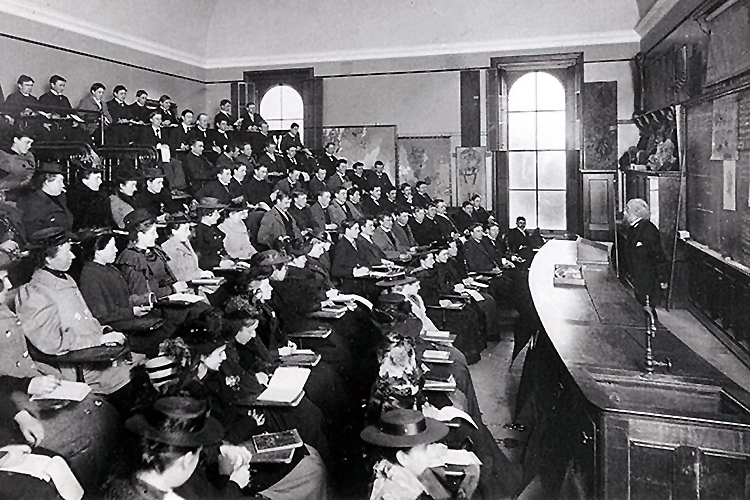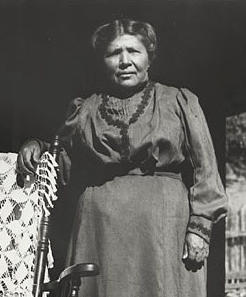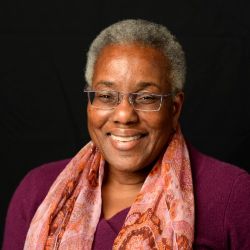UC Berkeley’s campus community brings women’s untold stories to the forefront
As part of the 150W History Project, academic departments compile research to celebrate the accomplishments of Berkeley women
October 16, 2020

Some of the first female students at UC Berkeley sit in the campus’ South Hall lecture room in the late 19th century. Berkeley’s 150W History Project is uncovering the stories of Berkeley women in celebration of “150 Years of Women at Berkeley.” (UC Berkeley photo)
Martha Horne was born in 1853 in the Klamath River Basin, near southern Oregon, and experienced the violent American invasion of her tribe’s land. Fluent in English, Horne grew up learning Indigenous languages such as Karuk, Shasta and Tolowa. She helped to preserve her tribe’s traditions, and her work documenting these languages with UC Berkeley researchers helped change the field of linguistics.
Agnes Fay Morgan was one of the first biochemists on the faculty at Berkeley, but was paid nearly half the salary of her male colleagues. Her research analyzed processed foods and established that sulfur dioxide protected vitamin C, but damaged thiamine, and in 1949, she won the Francis P. Garvan Medal in chemistry.
In the 1970s, Berkeley economics professor Laura D’Andrea Tyson would endure derogatory treatment for being a woman in academia; and once was told not to wear “tight jeans” while teaching, because it would make the “boys crazy.”
“There was a way in which my failure to recognize that economics was a male-dominated discipline for a long time really helped me,” Tyson said in an interview with Berkeley’s economics department. “… But when I realized that there were likely to be very few women in my program, and that there were very few well-known women in economics, I started to have my doubts.”
Those doubts would eventually dissipate, as Tyson went on to become in 1993 the first woman to serve as chair of the President’s Council of Economic Advisers.
These stories and experiences are just snippets from the countless biographies and profiles that UC Berkeley students, staff and faculty have begun to research and compile for their respective academic departments as part of Berkeley’s 150W History Project.
The project is a comprehensive online archive of stories about Berkeley women who have studied, worked and researched on campus throughout the years. It’s also part of “150 Years of Women at Berkeley,” or 150W, a yearlong celebration commemorating the anniversary of the UC Regents’ 1870 resolution that opened the university’s doors to women, on equal terms with men.
Led by Sheila Humphreys, Berkeley’s former director of diversity in the Department of Electrical Engineering and Computer Sciences, the project has compiled histories from over 25 academic departments, with each department creating its own website to feature Berkeley women from its particular field of study.
“I don’t think you know your history unless you make it visible in all of its diversity, and in all of its elements,” Chancellor Carol Christ said at a 150W Campus Conversations event earlier this week. “That’s why this project is important, … to make visible the extraordinary history of women at Berkeley.”
The Monday conversation was hosted by African American Studies Professor Ula Taylor and also included English Professor Emerita Catherine Gallagher and Humphreys.
The four women talked about the 150W History Project and how important those stories are to inform and inspire current Berkeley students.
“Hundreds of thousands of women have graduated from UC Berkeley, and thousands of staff, faculty and friends of the campus have made contributions to Berkeley and beyond,” said Taylor. “If there was ever a time to know our history, it is now.”
‘An ongoing legacy’
Emily Remirez, a sixth-year Berkeley Ph.D. candidate in linguistics, helped to unearth the stories of Berkeley women who have contributed to the study of linguistics throughout the years, some often having to overcome barriers due to their gender.
Spending time examining historical documents from those women’s lives, Remirez said, was a way to honor their experiences, especially those of women in marginalized groups who do not get the individual attention they deserve.

Archival photo of Martha Horne, an Indigenous woman featured in Women in Berkeley Linguistics. (Photo courtesy of Phoebe A. Hearst Museum of Anthropology, UC Berkeley)
“Seeing all of these women and all of their stories as a continuous narrative, part of the same story, was really beautiful,” Remirez said. “It made me feel deeply connected to these people who share aspects of my gendered experience. It made me feel like part of an ongoing legacy.”
Magdalene Crowley has worked at Berkeley’s Department of Electrical Engineering and Computer Sciences (EECS) for over 30 years and is currently its communications coordinator. Crowley sifted through articles and oral histories of Berkeley women to help compile profiles from her department.
Crowley discovered many firsts among the women she helped to highlight.
In 1969, Kawthar A. Zaki, who is currently a Berkeley professor emerita, became the first woman to earn a doctorate in electrical engineering from the EECS department. The department’s first female chair and the College of Engineering’s first female dean, Tsu-Jae King Liu, also is profiled. With an illustrious career in science, technology, engineering and math, Liu was named in 2018 one of the Most Influential Corporate Board Members by Women’s Inc.
Crowley said she found inspiration in these women’s stories.
“When we realize that it’s possible to accomplish something that we previously dismissed as impossible, it transforms our imaginations and expands the number of options we see in front of us,” said Crowley. “The more commonplace something becomes, the easier it becomes to imagine ourselves doing it, and the more likely we are to choose to attempt it.”
When it comes to politics, Berkeley has also had its fair share of trailblazing women.
In 1918, the first four women to ever win California Assembly races in the state all had Berkeley ties. That political lineage has continued today with the likes of Berkeley women like professor Janet Napolitano, who is a former UC president and a former U.S. Secretary of Homeland Security, and Berkeley alumna Pamela Spratlen, a foreign policy expert who spent nearly 30 years as a diplomat in the U.S. Department of State.
Henry Brady, dean of Berkeley’s Goldman School of Public Policy, said that throughout history it has been harder for women in academia to succeed because they have been denied opportunities. Brady recalls only seeing one female faculty member in the Goldman School when he started his tenure.

Pamela Spratlen’s profile is one of many untold stories revealed through Berkeley’s 150W History Project. (Photo courtesy of UC Berkeley Goldman School of Public Policy)
“We’re now almost at 50% female faculty at Goldman, and I’m really pleased with that,” Brady said. “We’ve added amazing people to our faculty, and the thought that we weren’t getting the benefit of those people in the past is really a shame and, to be honest, indicative of how important it is to have gender parity and diversity, more generally.”
Rhona Weinstein, a Berkeley professor emerita in psychology, said she arrived on campus in 1973 at a time when women were 3% of the faculty. Weinstein said she was “keenly aware of how visible, and yet invisible, we were” as women.
She recalled that it was “painfully visible” when female faculty were in a room full of male colleagues, yet they were ignored during times of appreciation and accomplishment — often not getting their deserved credit.
As a contributor to the 150W History Project, Weinstein said it is crucial to preserve the true accomplishments of women at Berkeley.
“We are revealing an untold story,” she said. “It is vital to acknowledge the incredible impact women have had in their fields, and essential to provide role models for the next generations.”
